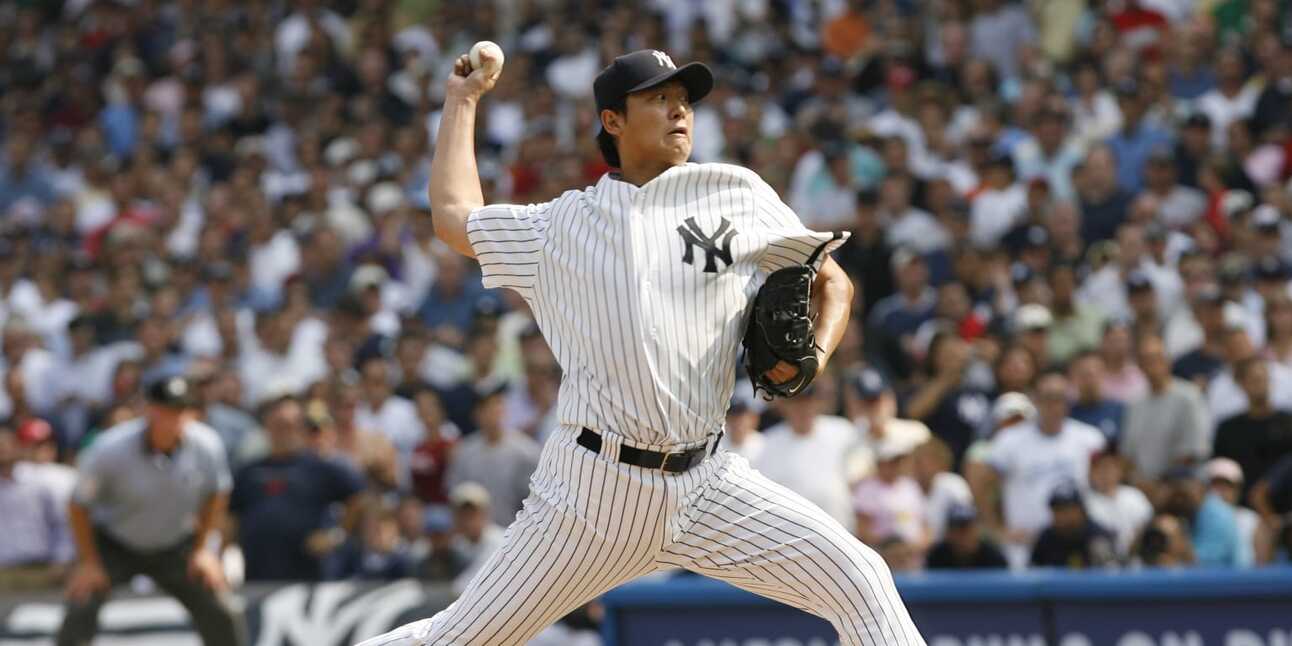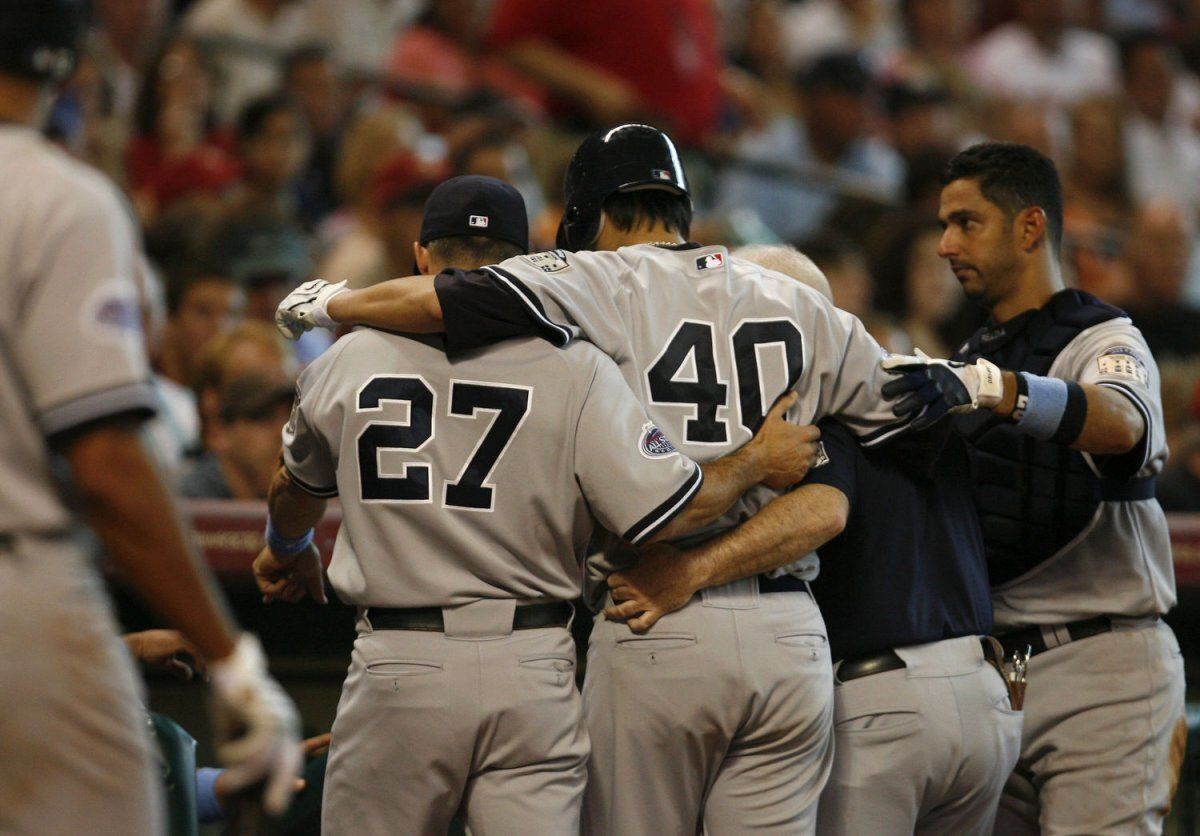
Welcome back to the next chapter of 2009 Yankees: The Last Championship - a week-by-week remembrance of the year in which they gave us their most recent World Series title. Already in the midst of a terrible season, Chien-Ming Wang hurt his arm, walked off the Yankee Stadium mound on the Fourth of July, and as it turned out, he never threw another pitch for the Yankees.
NEW YORK (July 4, 2009) - As had become custom whenever the Yankees won in walk-off fashion during their last championship season, A.J. Burnett snuck up behind this day’s hero, Jorge Posada, as he was doing the requisite post-game TV interview and splashed a cream pie in his face.
Posada had delivered a dramatic RBI single in the 12th inning to give the Yankees a come-from-behind 6-5 victory over the Blue Jays, and it should have been a great Fourth of July in the Bronx as this was New York’s ninth win in the 10 games since Brian Cashman’s impromptu trip to Atlanta, an endeavor the media credited for lighting a fire under the collective ass of a talent-laden, very well-paid, but clearly slumbering team.
In that span the Yankees had gone from five games behind AL East-leading Boston to just one back thanks to this victory, but once Posada wiped the pie off his face, he headed into a clubhouse where a pall was hanging because of something that happened a couple hours earlier.
Starting pitcher Chien-Ming Wang, in the midst of an already miserable season, was actually having a decent day and was looking like he was finally turning a corner. In his previous outing against the Mets on June 28, Wang had earned his first victory after six defeats and now he was building on that performance with five innings of two-run ball against Toronto which dropped his season ERA under 10.00 for the first time.
But in the sixth inning he gave up a double to Marco Scutaro and after recording an out, he was taken deep for a two-run homer by Adam Lind which gave Toronto a 4-3 lead. If only that was the worst of it, but on his next pitch to Scott Rolen, the ball arrived in Posada’s glove much slower than it was supposed to and the catcher knew something was wrong.
He immediately signaled to the bench and out came Joe Girardi and trainer Steve Donahue, and after consulting with Wang, he left the field and was sent for an MRI which revealed a shoulder strain and bursitis. “Mostly, I’m afraid it will take surgery to repair it,” Wang said after the game when learning the results of the scan. “That would be the worst case; I hope that’s not it.”
Sadly, it was.

Chien-Ming Wang was on track to become a Yankees great before injuries ruined his career.
Girardi tried to sound optimistically cautious when he said, “It was unfortunate because I thought today was his best start. It’s going to be rest and rehab similar to what most pitchers have when they have a shoulder strain. It’s just going to take some time. I’m confident he’ll be back, I just can’t tell you when.”
The answer would be 2011, and not with the Yankees, proving that managers are not doctors. Three weeks later it was confirmed that Wang had a tear in his shoulder capsule that required surgery, and just 29 years old at the time, Wang never threw another pitch for the Yankees.
He missed the rest of 2009, all of 2010, and by the time he was ready to pitch, the Yankees had moved on and he ultimately made only 65 more MLB appearances for the Blue Jays, Nationals and Royals. Much of the time between 2011 and 2016 was spent in the minors including stops in Syracuse and Buffalo, and Wang recalled, “I would wake up and not know where I am.”
After three years in the wilderness, he eventually wound up with the Royals in 2016 and pitched 38 games out of the bullpen before retiring at the age of 36, a once-promising career falling far short of where everyone thought it would.
The Yankees signed Wang out of his native Taiwan in 2000 and after working his way through the system, he made it to New York in 2005 and found a spot in Joe Torre’s rotation alongside studs like Randy Johnson and Mike Mussina. That year, with Kevin Brown, Jaret Wright and Carl Pavano battling injuries and/or poor performance, Wang filled part of that void and started 17 games plus one in the postseason.
He was instrumental in the Yankees’ season-long fight to win the AL East, ultimately tying the Red Sox for first place at 95-67 but winning the division based on their winning the season series with Boston 10-9. Following New York’s flameout in the division series against the Angels, Wang put together two tremendous seasons in 2006 and 2007 when he won 19 games both years, and in 2006 was runner-up to Minnesota’s Johan Santana in the AL Cy Young balloting.
One of Wang’s trademarks was his unflappable nature. Nothing seemed to bother him. One time, he got himself into a jam so pitching coach Ron Guidry - who held that job under Torre in 2006 and 2007 - went out to the mound for a visit.
“I looked at him and he looked at me, and he was waiting for me to say something,” Guidry said. “Finally I said, ‘You know you are making this game interesting.’ He goes, ‘How so?’ ‘Well, a minute ago you had a two-run lead, but now it’s in jeopardy because you put two guys on. If you give up a home run, we’re losing.’ He looks at me and says, ‘Oh, I better start pitching then.’”
He got out of the jam, and the Yankees went on to win the game.
From 2005 to 2008, Wang started 95 games and went 54-20 with a 3.79 ERA. The only pitcher in Yankees history who reached 50 victories faster was Guidry who did it in 82 games.
Wang looked like he was going to be a star for years to come, but in the middle of 2008, everything changed for the right-hander, and the demise began in the dumbest of ways. During a game in Houston - a National League park where, at that time, there was no DH so pitchers had to bat - Wang tore ligaments in his right foot running the bases.
He had reached base via a fielders’ choice after laying down a sacrifice bunt. With two outs, the next batter, Johnny Damon, hit a routine grounder to Houston shortstop Miguel Tejada for what should have been an easy inning-ending force at second, but Tejada booted the ball and Wang reached second base safely. Derek Jeter then followed with a single to right and Wang hurt himself as he rounded third and headed home.

Joe Girardi (27) and Jorge Posada help Chien-Ming Wang off the field in Houston in 2008.
Had Tejada made his play, Wang would not have been in the position he was, but hey, that’s life. Wang managed to limp home to score, but he needed help getting back to the dugout, and that was the last vision Yankees fans had of him that year. Wang missed the rest of the season and without him the Yankees missed the postseason for the first time since 1993.
Hank Steinbrenner, oldest son of George, sounded off about the lack of a DH in the NL and he said the league should “grow up and join the 21st century.” He added, “Am I pissed about it? Yes. I’ve got my pitchers running the bases, and one of them gets hurt. He’s going to be out. I don’t like that, and it’s about time they address it. That was a rule from the 1800s.”
He had a great point, and common sense regarding adding the DH to the NL finally arrived in the Covid season of 2020, and became permanent in 2022.
Wang was ready to go when he reported to spring training in 2009, but the foot injury screwed up his mechanics and he endured a titanic struggle as he could not dominate hitters the way he always had with his sinker, a pitch Guidry described as, “Filthy hard. It wasn’t like those guys who throw those little-bitty sinkers. This thing was heavy. When you hit it, it felt like you were hitting a bowling ball.”
Not in 2009. He lost his first three starts and they lasted a combined six innings, during which he allowed 23 earned runs on 23 hits and six walks with only two strikeouts and his ERA was 34.50.
“When in doubt, I would call the sinker. It made my job a lot easier. But he wasn’t as sharp in 2009. The ball wasn’t moving as much. It was just 2 or 3 mph slower, balls were up in the zone. He didn’t have that crisp sinker - it was more like a lazy runner.”
The third of those losses was a 22-4 massacre by Cleveland at the stadium, after which Wang said, “I feel fine.”
Well, clearly he wasn’t, and it was puzzling to understand what was wrong. One thing Girardi knew for sure, he couldn’t send Wang back to the mound in the near future so the Yankees sent him back to the spring training complex in Tampa - he couldn’t go down to Triple-A without going through waivers - to work out whatever mechanical issues he was having.
It was a month before he was back and Girardi used him three times out of the bullpen in May before giving him his first start on June 4 against Texas, but it was more of the same. He gave up five runs in 4.2 innings of a game the Yankees eventually won, and then he lost his next three starts to the Red Sox, Nationals and Braves during which his ERA was 6.39 in just 12.2 innings.
“There were times when I face setbacks, I would feel down and thought, ‘Why isn’t it completely recovered yet?’” Wang said when he was asked why he kept trying to pitch, even through all those days down in the minor leagues. “But I knew I wanted to keep pitching, I didn’t want it to be the end of my career. I wanted to let everyone in the game know that I can still pitch at a high level, that’s what kept me going all along.”

Here’s how the rest of Week 12 went for the Yankees:
June 30: After Brian Bruney coughed up a lead in the eighth that allowed the Mariners to tie the game, the Yankees put up three in their half with Melky Cabrera’s RBI doubled plating the winning run, and Jeter’s two-run single adding insurance in an 8-5 victory.
July 1: The Yankees won their seventh in a row as Andy Pettitte pitched seven strong innings in a 4-2 victory and all the runs came via homers, solo shots by Damon and Cabrera and a tiebreaking two-run blast by Alex Rodriguez in the sixth inning. A-Rod was finally starting to hit and was now 10 for his last 23 with 13 RBI during the winning streak. “There’s no question I feel more energetic,” he said. “The swing only comes if you have fuel in the tank.”
July 2: Seattle ended the winning streak 8-4 as CC Sabathia put up a clunker. The Mariners jumped him for three runs in the first inning and he eventually was knocked out in the sixth having allowed six runs on 10 hits and three walks.
July 3: The Blue Jays came to the stadium for a four-game wraparound series and A.J. Burnett held them in check for seven innings to key a 4-2 victory in the opener. Back on June 9 Burnett had pitched terribly against the Red Sox and he said at the time, “When I do get on that run, it’s going to be impressive. I promise you that.” In his four starts since he was 3-1 with a 0.99 ERA across 27.1 innings.
July 5: Three straight wins over the Jays as the Yankees overcame an 8-4 deficit when Hideki Matsui hit a three-run homer in the fourth, and then three more scored in the fifth as Jeter hit a two-run homer and Posada an RBI double. After Joba Chamberlain gave up eight runs, Jonathan Albaladejo and Alfredo Aceves blanked the Jays the rest of the way, Aceves pitching four one-hit innings.
July 6: The Jays avoided a four-game sweep as they scored six times off Pettitte, the big blow a three-run homer by Alex Rios.
NEXT SATURDAY: For whatever reason, the Angels gave the Yankees all kinds of problems in the first decade of the 21st century including playoff losses in 2002 and 2005. Games in Anaheim had been a particular problem and that continued as the Angels pulled off a three-game sweep just before the start of the All-Star break.


